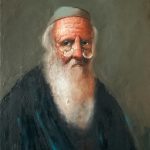
I was seven or eight when this little painting of an old wise man, probably a rabbi, caught my eye. The artist was selling his wares on the streets of Paris. I am not sure what about this painting caught my imagination as a young boy, but I insisted in getting it. I remember to this day that the painting was still wet with paint when I bought it, carefully caring for it as we made our trip home to the United States. The painting is still in my possession, hangs in my home and brings back some great memories.
I have heard that when you don’t feel good, you default to things that bring you great memories. We yearn for that favorite meal that your mother would cook, that old TV show you used to watch, a conversation with an old friend, a favorite hymn, that comfortable pair of shoes or a favorite little painting, all of which remind you of a happy time. I think that we all don’t feel too good right now and when I say “we,” I mean the whole world (except for the five astronauts on the space station). I have a desire to reach for things that are proven, solid, faithful, predictable and stable. I find myself revisiting the fundamentals of my faith, the basics, the very things that have attracted me all of these years. My walk with Jesus does this.
The algorithm
I recently had the opportunity to listen to a short commencement message by Rabbi Jonathan Sacks, who has served as Member of Parliament of the United Kingdom since 2009. I have always appreciated his ability to communicate the deeper elements of Judaism in a contemporary and sometimes humorous manner. I sense he is a wise man. During his commencement message he spoke of the “algorithm of being a Jew,” an interesting title for a speech. I listened and I learned. Typically, when we hear about algorithms, we think about things like Amazon Prime, Spotify, Netflix and various other scientific things, not usually our faith. However, think of an algorithm as simply “a process or set of rules to be followed in calculations or other problem-solving operations.” The rabbi outlined to a spongy crowd, in a few short minutes, God’s design and process. I was intrigued because I could not help but translate some of these principals to my own Christian faith, thinking of God’s algorithm or process for me, for us, for the world.
Relationships
I am reminded that all of my key relationships are strengthened by my faith. Relationships are difficult because there are so many competing motivations with each relationship. There exists a tension between what I want from the relationship and what I can contribute. I am prone to prejudge one’s actions. I have been hardwired to attach expectations to each relationship. I am not fully transparent or honest, and I have the ability to dismiss a person. However, I am created to be in relationship, and I would argue that the most cherished aspects of my life are my relationships. I learn from relationships. I grow from relationships. I find meaning through relationships, and relationships are the fields by which I serve my God and express my love for Him.
Rest
 I am reminded how important it is to rest. God has created us to incorporate a Sabbath, a rest. God created me to work, it’s part of my worship, and He has also created me to rest, it too is part of my worship. I am designed by my creator to need rest, and when I violate that core principle, it’s not only a show of my arrogance, but it’s also toxic and harmful. How do we find rest in such a busy and noisy world? I must be intentional about the rhythm of life because it does not come naturally, and often the reason it does not come naturally is because I am still deriving my worth from what I do more so than who I am. Rest, as God intended, has a way of resetting this rhythm.
I am reminded how important it is to rest. God has created us to incorporate a Sabbath, a rest. God created me to work, it’s part of my worship, and He has also created me to rest, it too is part of my worship. I am designed by my creator to need rest, and when I violate that core principle, it’s not only a show of my arrogance, but it’s also toxic and harmful. How do we find rest in such a busy and noisy world? I must be intentional about the rhythm of life because it does not come naturally, and often the reason it does not come naturally is because I am still deriving my worth from what I do more so than who I am. Rest, as God intended, has a way of resetting this rhythm.
Gratitude
I am reminded how important gratitude is to my faith. God gives me the capacity to be grateful though it’s a learned trait and one that must be exercised regularly. I am surprised by how often I default to complaining (even in a nice way) and tend to drift towards disappointment, coveting, jealousy, worry, anxiety, fear and the like. Therefore, rather than just feel guilty about my lack of gratitude and futilely try to change, I simply need to stop. Stopping allows me to reflect on His incredible grace, mercy, love and the provisions and protections that are associated with being one of His own. Gratitude puts me in my proper place; it fits me like your most comfortable sweater.
Grace
Lastly, I am reminded how gracious God is with me as He is always guiding me to learn and grow. He shows me the way. He truly is my Rabbi. I find that God is gracious by extending to me an internal moral code, that inner voice that says, “no” or “yes.” I have grandchildren of various ages and personalities. I find great joy in watching them learn. Recently several have learned to swim while others are learning to clean up after themselves, and some find great delight in helping with baking a sheet of sugar cookies. Each occasion brings great delight to their faces, which in turn also brings great delight to their teacher, parent, loved ones. I have watched my grandchildren develop that internal moral code too. God is patient with us as we learn, grow and develop, and when I fail and stumble, He is there to clean up the mess, teach me a better way and give me hope for a better day. God never ceases His work. Therefore, as I reflect on these difficult times and find myself drifting off to happy places and experiences, it’s good for me to be reminded that my ultimate comfort is found in my God, who is the same yesterday, today and tomorrow. I guess now I know why I picked that painting. My Rabbi caught my eye even as a little boy and continues to keep His eye on me, always present, always protecting and always providing.
 Stephan N. Tchividjian is the president and founder of the National Christian Foundation South Florida. Visit southflorida.ncfgiving.com to learn more.
Stephan N. Tchividjian is the president and founder of the National Christian Foundation South Florida. Visit southflorida.ncfgiving.com to learn more.
Read more articles by Stephan Tchividjian at: goodnewsfl.org/author/stephan-tchividjian/

Comments